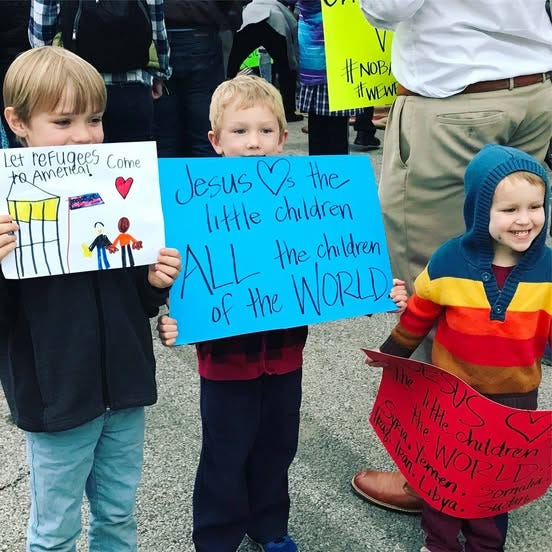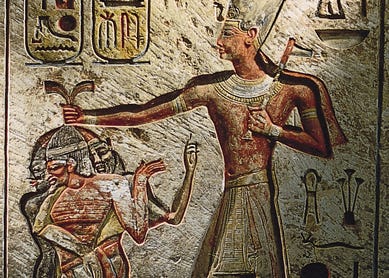Every Bible reader remembers Pharaoh’s enslavement of the Israelites. But it’s easy to forget that Pharaoh paved the way for this exploitative program by stirring up fear about “those people.” Just listen to what the most powerful man on earth says to his fellow Egyptians in Exodus 10:9-10
Look at the Israelite people, more numerous and stronger than we are! Come, let’s deal wisely with them. Otherwise, they will continue to multiply, and if a war breaks out, they will ally themselves with our enemies and fight against us and leave the country. (NET)
Pharaoh offers us a Master Class in racist fearmongering. At this point, the Israelites have been sojourning in Egypt for generations. Yet Pharaoh calls the Egyptians to look at them with new eyes. These Israelites are other. They may live here, but they aren’t really on our side. You can’t trust them. They may be aligned with our enemies. And they have far too many children. It’s like they’re taking over our country. Pretty soon, we won’t have any country left.
Such ethnocentric fearmongering paves the way for Pharaoh’s plan: Egypt will enslave the Israelites, making their lives “bitter by hard service” (Exodus 1:14). Oppression will allow the Egyptians to put these ethnic outsiders in their place and profit off of them, all at the same time.
What haunts me, though, is the way Pharaoh frames his oppressive program: “come, let’s deal wisely with them.” The ancients recognized that wisdom was crucial for communal flourishing. They particularly prized wise rulers. But here, Pharaoh shows us the kind of sick, twisted political wisdom that would stir up fear about the other in order to make them more easily exploited. Because while the “fear of the LORD is the beginning of wisdom,” “fear of the other” is often the “beginning of oppression.”
By the end of Exodus 1, Pharaoh’s fear-backed injustice includes the attempted genocide of Israelite boys. Yet Shiphrah and Puah, two brave midwives, resist. They risk their lives to hustle the Pharaoh, saving Israelite children and lying to their leader at the same time. And God rewards them for their “compassionate conspiracy.”*
Why did these compassionate conspirators resist Pharaoh’s evil? Because, Exodus tells us, “the midwives feared God” (Exodus 1:17). They rejected Pharaoh’s fear-mongering, and lived instead out of the Yahweh-fearing that leads both to wisdom and to costly acts of loving justice on behalf of the vulnerable.
Following in Pharaoh’s Footsteps
The Pharaohs of our world continue their fear mongering campaigns. According to
:“our political system thrives off of and seeks to cultivate fear . . . fear is promoted and used by political forces, and fear is used as justification to do harm to others.” Such fear is “promoted through increasingly sophisticated systems and campaigns,” leading us to “fear things” we “never would have thought to fear . . . because such a stance is deemed to be in service of a political cause.”
Such fearmongering is bipartisan, practiced by politicians and citizens across the political spectrum. But thinking about Pharaoh’s fear-mongering this week, I can’t help but reflect on President Trump’s relentless campaign to Make America Afraid Again, especially in relation to refugees. Despite the fact that the US Refugee Program has had 40 years of broad, bi-partisan support; despite the fact that refugees undergo the most thorough vetting of any other travelers to the US; despite the fact that many refugees are Christians and the vast majority of partner agencies that resettle refugees are run by Christians; despite the fact that studies suggest refugees make a positive net impact to the economy; and despite the fact that many studies suggest immigrants in general commit crime less than American-born citizens; Trump has been telling lies and stirring up fear about refugees since the earliest days of his first campaign.
He began by telling lies that vastly overstated the number of refugees America accepted, and then lying about the refugee process: “There was no way to vet these people, there was no documentation, nothing." He described the refugee program as a “Trojan horse” to bring in people “we have no idea who” they are or “where they come from.” “It’s going to end badly folks,” he warned. “We’ve got to have a country.” He derided some of the places from which refugees come as “shithole” countries.
These are lies. They are lies intended to stoke fear. That’s why the image of the “Trojan horse” is so powerful; it suggests that “they” are sneaking in here to harm “us.” And Trump has used his long history of lying about and demeaning refugees to justify essentially eliminating the refugee program, and even refusing to allow promised funding to go through to refugees who had already arrived earlier this year. As with Pharaoh, Trump’s sick immigration “wisdom” is rooted in lies about “them.” And those lies have led us to abandon some of the world’s most vulnerable people.

All of which makes the President’s decision to fast-track 54 white South African refugees so incredibly sickening. Because while Black Africans who have been going through the proper channels for years languish in situations of extreme poverty and vulnerability because Trump shut down the program, he somehow managed to get these white South Africans processed in a matter of months. Indeed, while Trump has called the situation in South Africa a “genocide” for white people,** he’s simultaneously ended protection for Afghan refugees in the US (including those who partnered with the US military), declaring that it’s safe for them to return to Afghanistan.
The decision to end a program resettling some of the world’s poorest and most vulnerable and then turn around and fast track a handful of white refugees is, it seems to me, obviously racist. Without realizing it, I think the administration has admitted as much. The White House’s own statement on why they were shutting down the refugee program expressed concern that refugees would not “assimilate into the United States.” Chris Landau, the US Deputy Secretary of State then stated that the reason these South African refugees were fast-tracked is that “they could be easily assimilated into our country.”
So white Africans can become American, but Black Africans or Afghans who partnered with our military cannot? When I hear such blatant racism, I can’t help but think of the hardworking, loving, community-building Black refugees I know, friends from my church, school, and community, who risked their lives to come to the US. Our country is better for them. We should be ashamed that our leaders would reject people who’ve been trying to “come to this country the right way” while living in refugee camps for years, only to open up a special lane for refugees who look like us… or at least those of “us” who are white.
The story of Pharaoh helps us recognize that these unjust fruits are rooted in the fearmongering that taught us to look at refugees as threats and potential enemies, rather than image bearers and potential friends. Exodus puts us on alert: it’s only Pharaohs who try to get us to fear “them.” Follow the Pharaoh’s fear, and you end in unjust folly. The only wise way forward is to reject the Pharaoh’s fear, and embrace the “fear of the LORD” instead.
Haunted by False Wisdom
To repeat, President Trump does not hold a monopoly on Pharaoh-esque fearmongering. Fear is stoked by politicians and citizens across the political spectrum. In future weeks, I’ll spend some time exploring scholars who argue that our hyper-partisan context makes it easy to see the failings of our political adversaries, and much harder to identify those of our own political “team.” I’m not free from these dynamics, and will share some ways I think my own political discipleship has struggled in relation to them down the road.
Some may take offense that I’ve spent time specifically calling Trump out. I want crossRhodes to be helpful for people from across the political spectrum, not least by inviting all of us to consider how Scripture might trouble our embrace of a hyper-partisan political culture.
But the fact that there’s plenty of bad Pharaoh-esque behavior to go around can’t keep God’s people from standing against Pharaoh-esque fearmongering when we see it. Whether you voted for Trump or not, right now he’s the most powerful political player in our nation, and one of the most powerful in the world. Whatever you think about the rest of Trump’s platform, if you think the President is wrong about refugees, then the challenge is to ask, as we did last week, how we might responsibly respond. I hope some of my American brothers and sisters might join me in:
calling our representatives to protest Trump’s treatment of refugees (this is particularly important if you voted for Trump, otherwise support aspects of his platform, or come from a strongly conservative region. A friend working on advocacy told me this week that such voices make more of a difference on issues like this)
supporting organizations like World Relief that continue to work with refugees and advocate for the refugee program,
using our influence to address the fear of “them” when we encounter it in our hearts and communities, and
praying for President Trump, and not least that God would change his heart towards refugees and other immigrants
As I thought about how much I often dislike that last point this week, I thought about my friend Brent Strawn’s surprising sermon “On Pharaohs.”*** Brent points out that the biblical portraits of the Pharaohs are surprisingly complex, inviting us to imagine not only the horrors of oppression by those Pharaohs, but also the possibility that we might become “Pharaohs” ourselves, and indeed, the great biblical hope that the door of repentance remains open for the Pharaohs of our world—including us.
If you’ve got other ideas, I’d love to hear them. And if you think I’m off my rocker, you can let me know that, too. Hope you come back to continue the discussion next week, and don’t forget to share crossRhodes with others who might find this weekly reflection useful.
Note: this was not the post I intended to write this week. I’ll get back to the question about politics and wisdom somewhere down the line!
*This phrase comes from Leon Kass’s book on Exodus, Founding God’s Nation.
**I don’t know enough about the situation of these white South Africans to have an opinion on whether they should qualify for the refugee program. I’m 100% convinced that they should not be allowed to skip to the front of a line that has been closed for everybody else.
***Now published in written form in Brent’s book The Incomparable God




So many good and important things in here. Thanks for sharing!